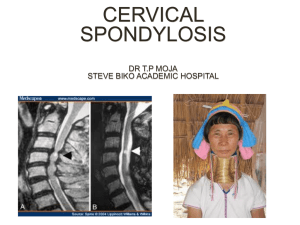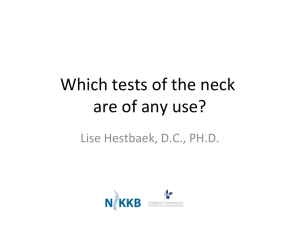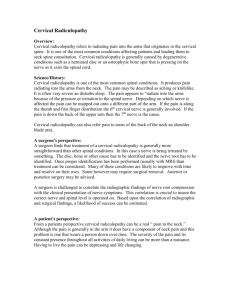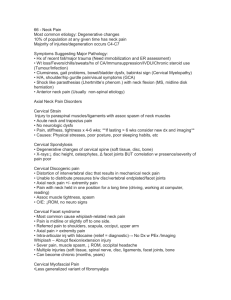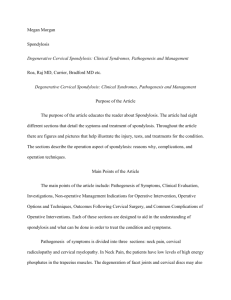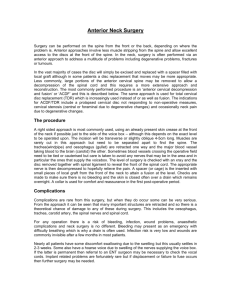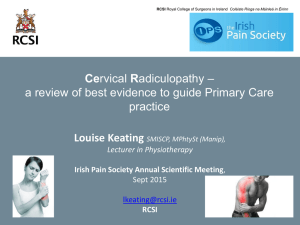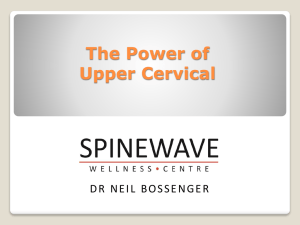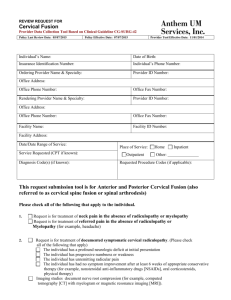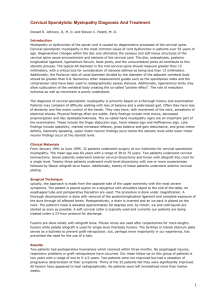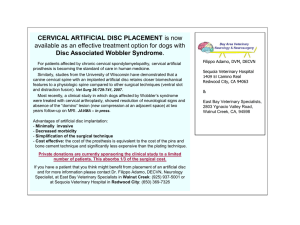Cervical Conditions: Diagnosis and Treatments
advertisement
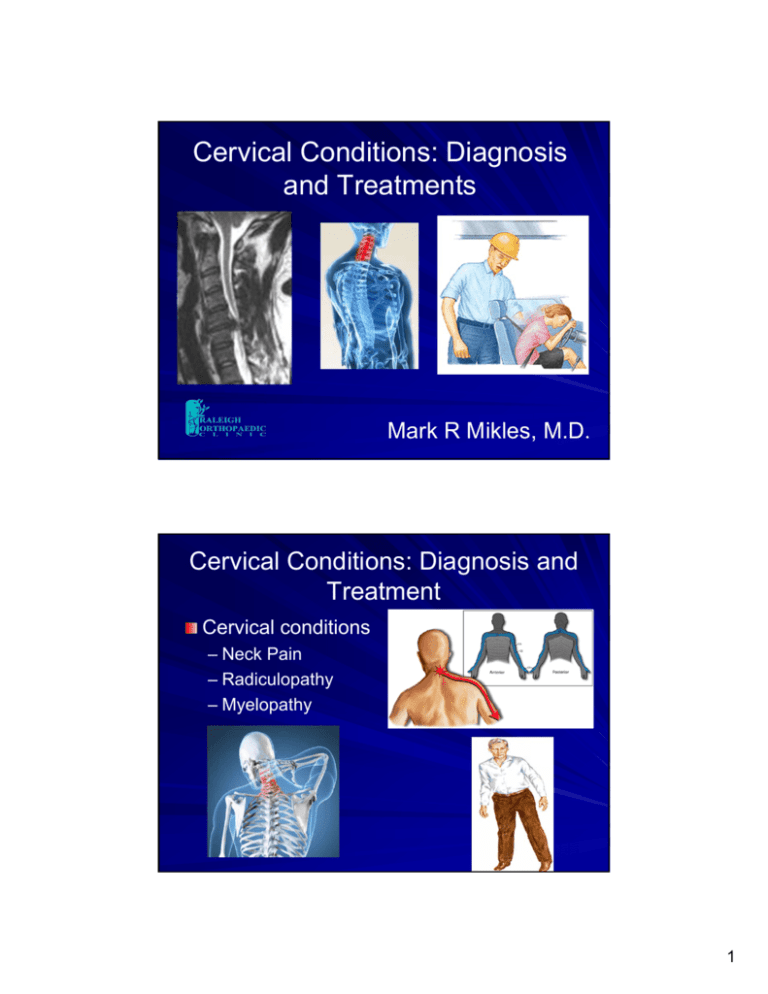
Cervical Conditions: Diagnosis and Treatments Mark R Mikles, M.D. Cervical Conditions: Diagnosis and Treatment Cervical conditions – Neck Pain – Radiculopathy – Myelopathy 1 Cervical Conditions: Diagnosis and Treatment Purpose Brief review of cervical anatomy and radiology Highlight primary disease conditions – Neck Pain – Radiculopathy – Myelopathy Highlight common treatments including surgical Anatomy Cervical Spine has 7 vertebral bodies C1-Atlas-”Ring” C2- Axis- with odontoid or Dens 2 C1- Atlas – No vertebral body – Wide lateral masses support the skull C2- Axis – Odontoid process (dens) pivot point for the C1 ring Upper cervical spine (occiput to C2): highly mobile – 60% rotation (50% C1-2) – 40% flex/ext Normal Anatomy Anterior 3 Neck Pain Cervical Strain – #1 cause for neck pain – Paraspinal muscle strain or stretch – Whiplash – 90% will improve w/i 4-6 wks w/ conserv tx NSAIDs, MR, exercises, PT Cervical Spondylosis “Neck Arthritis” Clinical Presentation – Axial neck pain Achy and recurrent – Usually neuro intact – Most common at C5-6 and C6-7 – Can have Cervical Radiculopathy – Can have Cervical Myelopathy 4 Cervical Radiculopathy Arm pain +/- neck pain Usually due to a HNP – r/o shoulder pathologyclinical exam – If associated w/ chest painER or PCP eval – Peripheral nerve compression Cubital tunnel, carpal tunnel + Tinnels sign Double crush syndrome Nerve conduction test Radiculopathy Tests Spurling’s (Head Compression) test – compression w/ neck extension & rotation to affected side Shoulder abduction test – reduces nerve root tension and relieves arm pain in 70% of pts w/ cervical radiculopathy 5 Cervical Radiculopathy Soft disc herniation – Typically acute pain – MRI needed Foraminal stenosis – Oblique cervical radiograph – Facet hypertrophy C5 Radiculopathy (C4-5) Deltoid Weakness Sensory Loss Biceps Reflex Can mimic shoulder pathology 6 C6 Radiculopathy (C5-6) Bicep Weakness WE Weakness Biceps Reflex Sensory Loss Can mimic Carpal Tunnel Syndrome C7 Radiculopathy (C6-7) Triceps Reflex Triceps Weakness Sensory Loss 7 C8 Radiculopathy (C7-T1) Horner’s Syndrome Interossei Weak Sensory Loss Ptosis, miosis, Sweat Can mimic Cubital Tunnel Syndrome Cervical Myelopathy Clumsiness of Gait – Loss of balance – May be presenting complaint Upper Extremity – Weakness/clumsiness – Hand Intrinsics Buttoning, writing – Dropping items – Tricep weakness – Diffuse parasthesias Lower Extremity – Mild weakness and N/T 8 Myelopathy tests Myelopathy tests for UMN Hoffman’s – thumb/index flexion produced by sudden middle DIP extension Lhermitte’s sign – electric shock down arms w/ passive flexion/compression of neck Babinski’s – nml response = downgoing toes Clonus and Hyperreflexia May have signs of spondylosis only on xray Imaging Diagnosis Lateral Cervical XRay – – – – – – Disc height Cervical lordosis Spondylotic subluxation Evidence of trauma Bone destruction Osteophyte formation 9 Imaging Diagnosis MRI – Rapidly performed – Non-invasive – Accurate diagnosis of disc herniations – Allows direct imaging of spinal cord – Signal change aids in localization Myelomalacia Imaging Diagnosis CT/Myelography – Invasive Needle stick – Possible spinal headache – Cannot directly image spinal cord – Better for osteophyte and spurs – Pt’s w/ pacemaker or defibrillator 10 Treatments Nonoperative – Medications – Physical Therapy Traction Chiropractic manipulation Steroid Injections Operative – Anterior approach Discectomy and fusion Disc replacement – Posterior approach Discectomy / Laminectomy +/- fusion Treatment of Neck Pain Pharmacologic – NSAIDS – Muscle Relaxants – Steroids Radiculopathy – Opioids limit 11 Treatment of Neck Pain Physical Therapy – Exercise – Education Passive Modalities – Heat/Cold – Soft Cervical Collar Not for >1-2 wks – Muscle weakness/dependence Treatment of Neck Pain Physical Therapy – Mechanical Traction – Massage – ROM exercises – Trigger Point Treatment – Ergonomics 12 Treatment of Neck Pain Spinal Manipulation – Chiropractor – No signs of instability, severe stenosis or myelopathy Steroid injections – Epidural injections No severe stenosis – Facet injections Treatment of Neck Pain Surgical Intervention – Surgical intervention for neck pain alone is discouraged Surgical Indications – Progressive neuro deficit – Disabling motor deficit – Persistent/recurrent radicular sxs w/ 6 wks of consv tx – Failed nonoperative tx w/ continued Neck pain plus arm pain or weakness 13 Anterior Surgery #1- Anterior cervical discectomy and fusion Can treat radiculopathy/ myelopathy w/ neck pain Pros Muscle-sparing approach Direct removal of anterior pathology without neural retraction Restore disc height and lordosis Predictable results Cons Hoarseness/ Difficulty swallowing Nonunion Loss of motion with >3 levels fused?/ accelerate ASD (3%/yr) Anterior cervical discectomy and fusion – Gold standard – Allograft/Cage – Plate and screws- decrease bracing – 1 night in hospital – Back to light duty w/i 2-4 weeks – Excellent results for 1 and 2 level disease 85-90% pain relief – Better tolerated than L spine surgery 14 Total disc replacement – Indications for cervical disc disease with radiculopathy – One level only – No facet joint arthritis or posterior disease – Recently FDA approved – Limited insurance coverage – Theoretically decrease incidence of ASD Posterior Surgery Laminotomy/ foraminotomy Discectomy – Treats radiculopathy with a unilateral HNP – No neck pain – No kyphosis Pros Avoid fusion Minimally invasive techniques Easier for large short neck pt Cons Symptoms may recur Increased risk of axial neck pain >30%, Herkowitz Can not safely remove ant path Loss of lordosis 15 Summary 2 main surgical pathologies in the C spine – Herniated Discs Radiculopathy – unilateral arm pain and weakness – Spinal stenosis Myelopathy- bilat arm +/- leg weakness Axial neck pain Almost always should be treated nonoperatively Poor outcomes w/ surgical intervention Summary Surgical intervention – After extensive conservative tx – Gold standard for 1-2 level disease ACDF – >3 level disease – dealer’s choice Multilevel ACDF/ corpectomy Posterior Laminectomy +/- fusion – Total disc replacement May be option for 1 level disease US experience early but promising 16 Thank You 17
